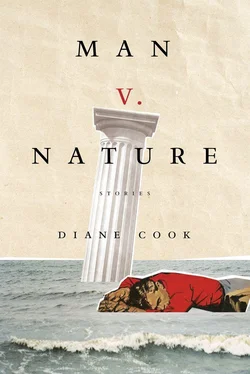There’s no bow, he says, but I’ll just throw it and hit something meaty. How hard can it be?
Alfred disappears into the woods, and before the pot of water is boiling he returns with a deer, small like a fawn but past its spots. He cleans, skins and hunks it, and we skewer the meat on broken saplings, roast it over a popping fire.
When we are full and warm and lying around the fire, drifting, I say, We are charmed boys.
The others sleepily hoorah, and Alfred smiles at me through the flickery orange light.
Life with boys is great!
No one tells us to behave, and yet we do. In our own way. When we get that feeling in our pits, we go into the woods and wrench large branches from living trees. We can pummel the flank of a dead deer and scream, and we don’t have to answer why because no one is asking us why. We all know why. We’re boys. We’ll stun a bird and twist its neck, and we’re on to the next thing. We don’t ask what did it ever do to us. We’ll set fires and watch them burn, and later, when we feel better, we’ll put them out. And wouldn’t you know, those fire spots bloom mushrooms for us to eat.
We get good at foraging. We have nut piles and traps to catch the squirrels that raid them. We collect bird eggs, and we eat the mom. A few boys become ace whittlers, and to shoot their arrows we bend bows from saplings, thread them with stretched sinew. We have a nice, organized camp, and when we yearn for our mothers, we have each other. No boy gives another boy a hard time ever.
The height of summer means berries. The small trees grow taller, and we hide among them when we hunt. We play games. Some old games, but also some new ones with extra-fun parts. Davey made up a tug-of-war done in heats. Ryan made up a chase through the forest, with tagging and spotting and no feet touching the ground. Everyone has a game, and we play them all, and no one has a favorite.
Each game has rules, and we make them complicated. That’s where our mothers got us wrong — boys like rules. But rules must also be a kind of game.
Sometime in late summer Alfred builds an obstacle course. It goes like this: Wade through the mud pit, swim across the river to the maze he hacked into grasses that have sprung human height along the banks. Out of the maze, slide under the fence of thorny branches he’s woven, and race to touch the deer-pelted tree. At that point the rules end. If you are fast, you can run to win. If you are strong, you can tackle the runner. If you are clever, you can let someone strong tackle someone fast, and while they wrestle, you win.
The first day we race the course, we finish ecstatic and spent under the tree.
When’d you do all this? we wheeze.
Alfred says, Sometimes I can’t sleep.
The leaves turn and fall, and we know we’re near winter. We crudely stitch skins together for warmth. Mushrooms explode; we fight animals for nuts. The deer huff down leaves like vacuums. All the animals we see are stuffing their faces, but many more have disappeared, getting tight in their dens. All the delicious berries are gone. Brian found an apple tree deep in the forest and picked every last one. We make ourselves sick on apples, then bury the rest in a hole for storage. Alfred says the tree is a sign there once was a farm here.
One morning we wake nestled in snow. The fire has been doused by melt. It smokes and sizzles. We shake the clumps off our sleeping pelts and sit in silence. We’ve only ever known winter in our homes.
We are months past our scheduled deaths, and now we are nearly starved.
We’ve eaten our nuts, our apples, our seeds, our mushrooms, our dried deer and squirrel and rabbit and fish. We break water from the frozen river. We suck on bark, chew leaves that have already been chewed by worms. We hook fingers around bones we never knew we had. This is our new game because we’re too tired to run.
We dig through the snow for animal bones to boil. We must have squandered something when we were just new and careless boys, left scraps decomposing on the forest floor. We roam deeper and deeper into the woods, days from our camp, sleep in the open so that we can travel even farther. One day we see a track and follow it up into the mountains, where we find a deer struggling in the snow and pounce, kill it with our hands even though we have weapons. We just don’t think. But it’s a starved deer, almost meatless, and it gives us strength for only a week. Every creature is a ghost. We can’t find the end of the forest to leave it, and we can’t leave it because we have nowhere to go.
Davey is curled around a tree, his neck turned like he’s looking at something in the middle of his back. He is dead.
Maybe he was climbing and fell.
Maybe he was chasing an animal and didn’t see the tree.
Who cares what happened, Alfred says. What are we going to do with him?
We stand around the body, kick holes in the crusty snow.
A few boys punch their guts guiltily. Their stomachs are cursing.
George says, Don’t do that. Don’t even think it.
Michael says, But he is dead.
George says, Can’t we just say congratulations, we beat the Chute? We did our best out here, but it got too hard?
And just let death come without a fight? cries Brian.
A boo rises in my throat, but I stuff it back down.
Alfred says, Survivors always say yes.
But we have survived, George practically whispers, his eyes on Davey’s gaping mouth, his slack, black tongue. We’re not even supposed to be alive.
If we don’t, I say shakily, some animal will. What’s the difference?
Some boys nod at me, and I’m proud, then embarrassed.
We drag Davey back to camp, but George stays in the woods. It’s a good day for walking, he says. The sun is shining.
The meal is not delicious, though that seems appropriate for poor Davey. We are full, and we don’t feel better.
What’s left of him we smoke, string up the meat in trees to keep. We gather his bones — we’ll boil them in a desperate broth. We ball the bloodied snow to suck on later. All the while, we clutch our stomachs and weep. After starvation this sudden food brings great pain.
George returns in the moonlight. I spy him taking tentative bites off scraps as the others sleep.
After a week Davey is gone, and we’re hungry boys again.
What are we to do? we say gravely. We eye one another and wish someone would keel over and die.
Alfred replies, equally gravely, As many as can, must survive in order to keep this place going, for all the Not-Needed boys to come.
We nod. We hope we all survive.
He says, It’s wrong, what the State did to us. Doesn’t each boy deserve a chance to earn his own life? Alfred is standing on a boulder. He looks very official.
We nod again, some of us more vehemently than others. I’m reminded of my mother and her last bitter face.
Please, Alfred, George says. Please don’t say what you’re about to say. He doesn’t have to say it, though. We all know .
Alfred steps down from the boulder and wanders among us. He touches our shoulders. They are bones. As many as can, must survive, he repeats. Our lives are valuable, aren’t they? We should be given a chance to earn them. He makes a fist. We should earn our lives through competition. The loser hasn’t earned his right to live, but in losing he gives the rest of us another chance. He pauses. And in turn we give the loser what the State couldn’t — a fair death. What boy can hope for more? It’s the only right thing.
He returns to his rocky perch. Let’s fight for our lives like we’re meant to. Let’s show the State what it means to be fair and just.
All the boys nod. We feel hungry. We feel horrible. We want to feel anything else. So we close our eyes and cast sticks. Alfred counts. We have all agreed it is right. Even George.
Читать дальше












